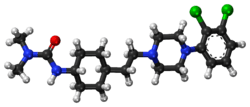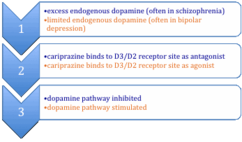Cariprazine
Cariprazine (/kəˌripˈrəziːn/), sold under the brand names Vraylar in the United States and Reagila in Europe, is an atypical antipsychotic which is used in the treatment of schizophrenia, bipolar mania,[1] and bipolar depression.[2] It acts primarily as a D3 receptor and D2 receptor partial agonist, with high selectivity for the D3 receptor.[3] Positive Phase III study results were published for schizophrenia and mania in early 2012, and for bipolar disorder I depression from a Phase II trial in 2015.[4][5] It is also potentially useful as an add-on therapy in major depressive disorder.[6]
 | |
 | |
| Clinical data | |
|---|---|
| Trade names | Vraylar (U.S.), Reagila (E.U.) |
| Other names | RGH-188 |
| AHFS/Drugs.com | vraylar |
| Routes of administration | By mouth (capsules) |
| ATC code | |
| Legal status | |
| Legal status |
|
| Pharmacokinetic data | |
| Bioavailability | High |
| Protein binding | 91–97% |
| Metabolism | Hepatic via CYP3A4 and to a lesser extent CYP2D6 |
| Metabolites | Desmethylcariprazine |
| Elimination half-life | 2–5 days (2–3 wks for active metabolite, desmethylcariprazine) |
| Excretion | Urine (21%), bile |
| Identifiers | |
| |
| CAS Number | |
| PubChem CID | |
| IUPHAR/BPS | |
| DrugBank | |
| ChemSpider | |
| UNII | |
| KEGG | |
| ChEBI | |
| ChEMBL | |
| CompTox Dashboard (EPA) | |
| Chemical and physical data | |
| Formula | C21H32Cl2N4O |
| Molar mass | 427.41 g·mol−1 |
| 3D model (JSmol) | |
| |
| |
Rights are currently owned by Gedeon Richter and Actavis. The drug received FDA approval on September 17, 2015.[7]
Medical uses
Cariprazine is used to treat schizophrenia and manic or mixed episodes associated with bipolar I disorder.[8]
Side effects
Side effects may first appear on the first day after starting cariprazine.[9] The most prevalent side effects for cariprazine include akathisia, insomnia, and weight gain. Cariprazine does not appear to impact prolactin levels, and unlike many other antipsychotics, does not increase the QT interval on the electrocardiogram (ECG). In short term clinical trials extrapyramidal effects, sedation, akathisia, nausea, dizziness, vomiting, anxiety, and constipation were observed. One review characterized the frequency of these events as "not greatly different from that seen in patient treated with placebo"[10] but a second called the incidence of movement-related disorders "rather high".[11][12]
Regarding side effects, the label of cariprazine states, "The possibility of lenticular changes or cataracts cannot be excluded at this time."[9]
Pharmacology
Pharmacodynamics
| Site | Ki (nM) | IA (%) | Action |
|---|---|---|---|
| 5-HT1A | 2.6 | Partial agonist | |
| 5-HT2A | 18.8 | Antagonist | |
| 5-HT2B | 0.58 | Antagonist | |
| 5-HT2C | 134 | Inverse agonist | |
| 5-HT7 | 111 | Antagonist | |
| α1A | 155 | Antagonist | |
| D2L | 0.49 | ~40% | Partial agonist |
| D2S | 0.69 | ~40% | Partial agonist |
| D3 | 0.085 | ~60% | Partial agonist |
| H1 | 23.2 | Antagonist | |
| mACh | >1,000 | Antagonist | |
| The smaller the Ki value, the more strongly the drug binds to the site. IA=intrinsic activity. | |||

Unlike many antipsychotics that are D2 and 5-HT2A receptor antagonists, cariprazine is a D2 and D3 partial agonist. It also has a higher affinity for D3 receptors. The D2 and D3 receptors are important targets for the treatment of schizophrenia, because the overstimulation of dopamine receptors has been implicated as a possible cause of schizophrenia.[14] Cariprazine acts to inhibit overstimulated dopamine receptors (acting as an antagonist) and stimulate the same receptors when the endogenous dopamine levels are low. Cariprazine's high selectivity towards D3 receptors could prove to reduce side effects associated with the other antipsychotic drugs, because D3 receptors are mainly located in the ventral striatum and would not incur the same motor side effects (extrapyramidal symptoms) as drugs that act on dorsal striatum dopamine receptors.[15] Cariprazine also acts on 5-HT1A receptors, though the affinity is considerably lower than the affinity to dopamine receptors (seen in monkey and rat brain studies).[15][16] In the same studies, cariprazine has been noted to produce pro-cognitive effects, the mechanisms of which are currently under investigation. An example of pro-cognitive effects occurred in pre-clinical trials with rats: rats with cariprazine performed better in a scopolamine-induced learning impairment paradigm in a water labyrinth test. This may be due to the selective antagonist nature of D3 receptors, though further studies need to be conducted.[15] This result could be very useful for schizophrenia, as one of the symptoms includes cognitive deficits.
Cariprazine has partial agonist as well as antagonist properties depending on the endogenous dopamine levels. When endogenous dopamine levels are high (as is hypothesized in schizophrenic patients), cariprazine acts as an antagonist by blocking dopamine receptors. When endogenous dopamine levels are low, cariprazine acts more as an agonist, increasing dopamine receptor activity.[17] In monkey studies, the administration of increasing doses of cariprazine resulted in a dose-dependent and saturable reduction of specific binding. At the highest dose (300 μg/kg), the D2/D3 receptors were 94% occupied, while at the lowest dose (1 μg/kg), receptors were 5% occupied.[16]
Pharmacokinetics
Cariprazine has high oral bioavailability and can cross the blood brain barrier easily in humans because it is lipophilic.[5] In rats, the oral bioavailability was 52% (with a dose of 1 mg/kg).[12]
Cariprazine is metabolized primarily by the cytochrome P450 3A4 isoenzyme (CYP3A4), with some minor metabolism by CYP2D6. Cariprazine does not induce the production of CYP3A4 or CYP1A2 in the liver, and weakly, competitively inhibits CYP2D6 and CYP3A4.[8]
Research
It has been investigated as a potential adjunct in treatment-resistant major depressive disorder.[8]
References
- Agai-Csongor E; Domány G; Nógrádi K; Schmidt E; Galambos J; Vágó I; Keserű GM; Greiner I; Laszlovszky I; Gere A; Schmidt E; Kiss B; Vastag M; Tihanyi K; Sághy K; Laszy J; Gyertyán I; Zájer-Balázs M; Gémesi L; Kapás M; Szombathelyi Z (2012). "Discovery of cariprazine (RGH-188): a novel antipsychotic acting on dopamine D3/D2 receptors". Bioorg. Med. Chem. Lett. 22 (10): 3437–3440. doi:10.1016/j.bmcl.2012.03.104. PMID 22537450.
- Earley W1; Burgess MV1; Rekeda L1; Dickinson R1; Szatmári B1; Németh G1; McIntyre RS1; Sachs GS1; Yatham LN1 (2019). "Cariprazine Treatment of Bipolar Depression: A Randomized Double-Blind Placebo-Controlled Phase 3 Study". American Journal of Psychiatry. 176 (6): 439–448. doi:10.1176/appi.ajp.2018.18070824. PMID 30845817.
- Kiss B; Horváth A; Némethy Z; Schmidt E; Laszlovszky I; Bugovics G; Fazekas K; Hornok K; Orosz S; Gyertyán I; Agai-Csongor E; Domány G; Tihanyi K; Adham N; Szombathelyi Z (2010). "Cariprazine (RGH-188), a dopamine D(3) receptor-preferring, D(3)/D(2) dopamine receptor antagonist-partial agonist antipsychotic candidate: in vitro and neurochemical profile". The Journal of Pharmacology and Experimental Therapeutics. 333 (1): 328–340. doi:10.1124/jpet.109.160432. PMID 20093397.
- Durgam, Suresh; Earley, Willie; Lipschitz, Alan; Guo, Hua; Laszlovszky, István; Németh, György; Vieta, Eduard; Calabrese, Joseph R.; Yatham, Lakshmi N. (2016). "An 8-Week Randomized, Double-Blind, Placebo-Controlled Evaluation of the Safety and Efficacy of Cariprazine in Patients with Bipolar I Depression". American Journal of Psychiatry. 173 (3): 271–281. doi:10.1176/appi.ajp.2015.15020164. PMID 26541814.
- Gründer G (2010). "Cariprazine, an orally active D2/D3 receptor antagonist, for the potential treatment of schizophrenia, bipolar mania and depression". Current Opinion in Investigational Drugs. 11 (7): 823–832. PMID 20571978.
- "Safety and Efficacy of Cariprazine As Adjunctive Therapy In Major Depressive Disorder - Full Text View - ClinicalTrials.gov". clinicaltrials.gov. U.S. National Library of Medicine. Retrieved 6 December 2018.
- "FDA approves new drug to treat schizophrenia and bipolar disorder". U.S. Food and Drug Administration. September 17, 2015.
- Citrome, L (February 2013). "Cariprazine: chemistry, pharmacodynamics, pharmacokinetics, and metabolism, clinical efficacy, safety, and tolerability". Expert Opinion on Drug Metabolism & Toxicology. 9 (2): 193–206. doi:10.1517/17425255.2013.759211. PMID 23320989.
- "VRAYLAR™ (cariprazine) capsule" (PDF). Actavis Pharma. Retrieved 6 December 2018.
- Citrome L (February 2013). "Cariprazine in schizophrenia: clinical efficacy, tolerability, and place in therapy". Adv Ther. 30 (2): 114–26. doi:10.1007/s12325-013-0006-7. PMID 23361833.
- Veselinović T, Paulzen M, Gründer G (November 2013). "Cariprazine, a new, orally active dopamine D2/3 receptor partial agonist for the treatment of schizophrenia, bipolar mania and depression". Expert Rev Neurother. 13 (11): 1141–59. doi:10.1586/14737175.2013.853448. PMID 24175719.
- Newman-Tancredi, A.; Kleven, MS. (Aug 2011). "Comparative pharmacology of antipsychotics possessing combined dopamine D2 and serotonin 5-HT1A receptor properties". Psychopharmacology. 216 (4): 451–73. doi:10.1007/s00213-011-2247-y. PMID 21394633. S2CID 5835943.
- Roth, BL; Driscol, J. "PDSP Ki Database". Psychoactive Drug Screening Program (PDSP). University of North Carolina at Chapel Hill and the United States National Institute of Mental Health. Retrieved 14 August 2017.
- Seeman, P.; Kapur, S. (Jul 2000). "Schizophrenia: more dopamine, more D2 receptors". Proceedings of the National Academy of Sciences of the United States of America. 97 (14): 7673–5. Bibcode:2000PNAS...97.7673S. doi:10.1073/pnas.97.14.7673. PMC 33999. PMID 10884398.
- Gyertyán, I.; Kiss, B.; Sághy, K.; Laszy, J.; Szabó, G.; Szabados, T.; Gémesi, LI.; Pásztor, G.; et al. (Nov 2011). "Cariprazine (RGH-188), a potent D3/D2 dopamine receptor partial agonist, binds to dopamine D3 receptors in vivo and shows antipsychotic-like and procognitive effects in rodents". Neurochemistry International. 59 (6): 925–35. doi:10.1016/j.neuint.2011.07.002. PMID 21767587. S2CID 140205658.
- Seneca, N.; Finnema, SJ.; Laszlovszky, I.; Kiss, B.; Horváth, A.; Pásztor, G.; Kapás, M.; Gyertyán, I.; et al. (Dec 2011). "Occupancy of dopamine D₂ and D₃ and serotonin 5-HT₁A receptors by the novel antipsychotic drug candidate, cariprazine (RGH-188), in monkey brain measured using positron emission tomography". Psychopharmacology. 218 (3): 579–87. doi:10.1007/s00213-011-2343-z. PMC 3210913. PMID 21625907.
- Citrome, L (February 2013). "Cariprazine in Schizophrenia: Clinical Efficacy, Tolerability, and Place in Therapy". Advances in Therapy. 30 (2): 114–126. doi:10.1007/s12325-013-0006-7. PMID 23361833.